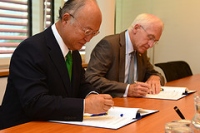Two organizations dedicated to cooperation in the use of nuclear energy have agreed to work more closely together to support the safe and reliable operation of nuclear power plants worldwide.
 |
| Yukiya Amano and Laurent Stricker sign up for closer cooperation (Image: Dean Calma/IAEA) |
Members of both the International Atomic Energy Agency (IAEA) and the World Association of Nuclear Operators (WANO) urged the two bodies to strengthen collaboration following on from the experiences of the Fukushima nuclear accident of March 2011.
A new memorandum of understanding (MoU) has now been drawn up to reflect increased cooperation between the two, and was signed in Vienna during the IAEA's general conference. It will enable the organizations to work more closely together to support nuclear plant safety and reliability, as well as enhancing information exchange on operating experience and other relevant areas.
WANO is a non-profit member association bringing together every company in the world that operates nuclear power facilities. Founded in 1989, its mission is to maximize nuclear plant safety and reliability by enabling operators to work together to assess, benchmark and improve performance through mutual support, information exchange and by sharing best practices. The organization's strict external confidentiality policy encourages full and frank internal information exchange between operators.
While WANO brings together nuclear operators, the IAEA is the intergovernmental forum for scientific and technical cooperation in nuclear technology, and is an autonomous organization under the United Nations.
The new MoU will see the two organizations adopt a more coordinated approach to their respective activities as well as enhancing information exchange, with staff from both agencies to meet periodically to discuss major safety-related activities. The MoU also includes plans to coordinate the timing of IAEA Operational Safety Review Team (OSART) missions and WANO peer reviews, both crucial to the two bodies' programs.
Initiated at the request of plant operators, WANO peer reviews are carried out by an independent team from outside the utility to highlight strengths and areas for improvement in nuclear safety and plant reliability in a report that is highly confidential. WANO aims to conduct a peer review at every nuclear reactor at least once every six years.
IAEA's OSART review process includes in-depth reviews of operational safety performance at nuclear power plants. OSART focuses more closely on the human aspect of nuclear plant operation than on plant technology, with team members are tasked with studying the operation of the plant and the performance of the plant´s management and staff.
As well as coordinating the work their respective performance indicator programs, the two bodies will work towards exchanging information and support in the event of a serious event at a nuclear power plant or fuel cycle facility. They will also supply staff to each other's review teams when appropriate and regularly exchange documents on operating experience.
IAEA director general Yukiya Amano said the agreement was an important step in strengthening cooperation and enhancing the flow of information on nuclear safety issues, while WANO chairman Laurent Stricker said he was confident the new agreement would help the organizations to jointly meet the challenges faced by the post-Fukushima nuclear industry. "An important lesson we learned from Fukushima was the need for WANO to be better connected to and engaged with the IAEA," Stricker noted.
Researched and written
by World Nuclear News














